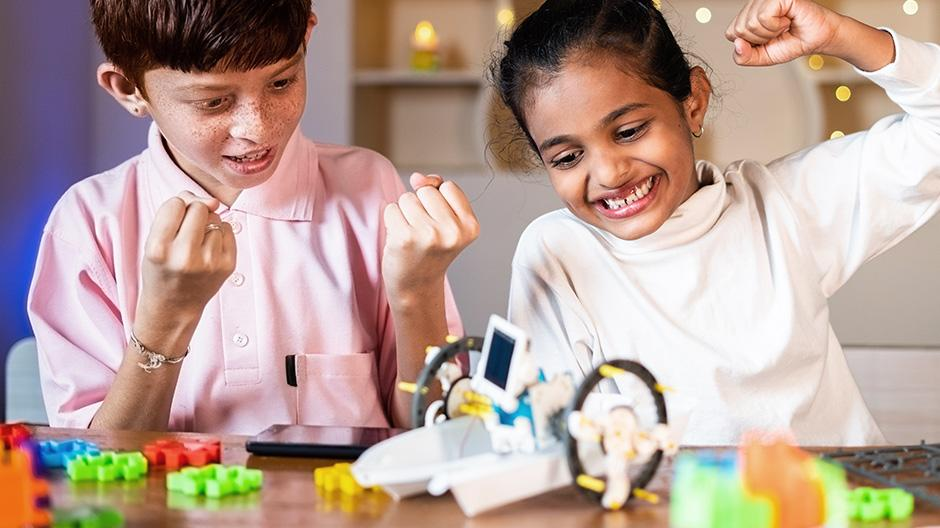Reading aloud to your child can benefit them in many ways and is especially important for establishing a strong foundation for their learning journey. But how exactly does it help?
We’re here to explain why reading aloud with your child on a daily basis is so important. We also give you some tips on how to make sure to maximize the fun and functionality of your reading time together.
How Reading Aloud Benefits Your Child
There are some lessons and experiences that children just can’t get from the classroom.
Home life is important for setting up those foundational building blocks that form your child’s personality, influence their learning style, and all the other wonderful things that make them unique!
Reading at home is no exception to this rule. Kids absorb the behaviors and information put in front of them. This means that if they’re raised in an environment that encourages reading, they’re more likely to develop into strong readers as they get older.
But it’s not just about telling them how important it is to read. It’s about showing, too! That’s why reading aloud is important. Let’s talk about the ways reading aloud with your child benefits them.

Having A Familiar Voice To Help
The intimacy of reading together — even with an infant — fosters a warm bond between an adult, a child, and reading.
By pointing to pictures and reading books aloud (even before your child can speak!), you’re showing them the importance and beauty of books, stories, and language.
Reading aloud to your child also offers a vocabulary bonus. As you read, your child will hear new vocabulary words in context, which is an ideal way to increase their flexibility with words!
Strengthening Imagination
Reading aloud to your child opens doors that encourage them to engage in their own storytelling, fosters their sense of empathy, and, most of all, encourages their imagination.
As you read with your child, their understanding of the world expands. They are able to imagine new things and events that exist outside of their own experiences — and even their own reality (if only there were talking animals to hang out with)!

Encouraging Curiosity
There are so many books in the world: fiction and nonfiction, books that have moral lessons to share, and books with fascinating information to discover! Sharing a wide variety of books with your child will encourage their curiosity along with their imaginations.
Your child may want to ask you questions about the things you read aloud together, or even things they hear secondhand on the radio or on media. This is great and might offer opportunities to dig into new books to read aloud!
Inquiring about the world around them will help support your child’s reading ventures in the future and form them into willing, enthusiastic learners.
Highlighting Your Child’s Interests
Your child may be the type to fixate on a specific idea, hobby, or interest. Although this might set off alarm bells for you — maybe you want them to learn and try new things — it can be a great opportunity to understand your child’s wants and needs.
For example, if your child loves a specific book and asks you to read it aloud every night, this story may hold some clues to what your child might be thinking, feeling, or wondering.
Books that prioritize things kids love can help them stay more engaged with and excited about their reading time!

7 Fun And Easy Tips For Reading Aloud
1) Let Your Child Choose
Allowing your child to explore and choose from books on their bookshelf gives them more incentive to get involved, pay attention, and take control of their learning journey.
Even though it seems small, an opportunity to express their independence and autonomy is important for encouraging your child to get invested in their reading development.
2) Start Small And Work Your Way Up
If you find that your child can’t seem to sit still for the entirety of a book, don’t worry! Kids’ attention spans tend to increase as they are read to more often.
We recommend starting small. Even if it’s just 10 minutes a day, try to get in a few minutes of dedicated reading time. After a while, you may find it easier to increase your reading time together each day.
That being said, don’t stress if you find yourself struggling to fit in reading time every now and then. It’s OK to miss a session here and there — we’re all doing the best we can as parents!
Consistency is key, but so is patience. We always want to encourage a reading environment that is fun, easy, personalized, and effective for your child. If your child responds best to shorter or fewer sessions, then go with that.
3) Get Into Character
Most books have more than one character in them. Why not change up your voice to reflect them?
Getting into character while reading aloud can really help your child focus and immerse themselves in the story you’re reading together.
Vary your tone, your accent, your volume — anything that gets your child giggling and invested! If you’re good at impressions, acting out the scenes in a book as their favorite character may also be a huge hit.

4) Don’t Be Afraid To Ditch The Words
For young children, it’s especially important to follow along with the words in a story to become familiar with how words look on paper. But this only promotes one aspect of their reading skills.
Every now and then, you might consider asking about your child’s understanding of what’s going on in the story. Referencing the pictures in a book can help kids pick up some context clues.
If you want to try this, you can ask them about what they think is happening at certain points in the story based on the pictures, why they feel that way, and what they think may happen next.
5) Practice Repetition
By reading the same book over and over, your child can get familiar with the scenes in a story and begin to engage more deeply with the story’s messages.
This technique can be really effective in developing their reading comprehension! If you choose, you can encourage them to think more carefully about the story by asking them questions about the things you read together.
You may also find that after a zillion readings, your child actually starts reading the book on their own!

6) Carry A Book With You
You’re in a doctor’s waiting room, or on a bus ride, or waiting for laundry to be done at the laundromat. Why not pull out a book to read to your child to pass the time?
You can’t read while driving, of course, but you could put on an audiotape of a great story and listen to it together with your child.
Reading everywhere has all the advantages we’ve talked about, but it also shows your child that reading is a wonderful way to pass the time — anywhere and any time!
7) Don’t Stop Reading!
Keep reading to your child even when they are able to read for themselves. You can read longer books or books that are harder than they are ready to read independently.
This often inspires children to want to increase their reading power so that they can read more challenging books on their own.
Reading Aloud Is Only The Beginning Of The Journey

Once you make reading aloud to your child a key part of your day, we hope you will also find it to be the part you both most look forward to sharing.
And for those days or nights when you need an extra helping hand, consider giving our HOMER app a try. You’ll find many stories, fiction and nonfiction, that your child can listen to on their own — or with you by their side.
All in all, reading aloud is one of the best ways to foster an interest in reading in your child. We hope our tips gave you some new ideas (or sparked some other ones!) for your reading routine .












